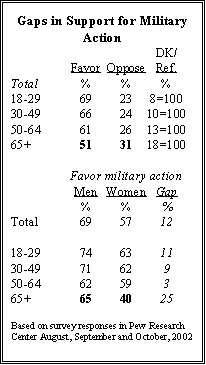 As protests grow on college campuses against a possible war in Iraq, young Americans are supporting military action against Baghdad by three-to-one (69%-23%), a wider margin than any other age group. By contrast, the oldest Americans express the most reservations about using military force in Iraq. Barely half of those age 65 and older (51%) back military action against Iraq, while 31% are opposed.
As protests grow on college campuses against a possible war in Iraq, young Americans are supporting military action against Baghdad by three-to-one (69%-23%), a wider margin than any other age group. By contrast, the oldest Americans express the most reservations about using military force in Iraq. Barely half of those age 65 and older (51%) back military action against Iraq, while 31% are opposed.
The generation gap over Iraq would seem to be at odds with conventional wisdom, derived from memories of Vietnam and other conflicts, which holds that young people are more likely than their elders to oppose war. Yet in surveys taken just prior to the Persian Gulf War – and even during the Vietnam War – young people also supported military action at higher levels than older Americans.
While age differences over using force in Iraq are comparable to those in previous conflicts, the gender gap appears to be somewhat smaller than in the past. Men are more supportive than women of taking military action against Iraq, but age is a major factor here as well. A solid majority of women in every age group favor the use of force to remove Saddam Hussein from power, with the notable exception of women age 65 and older. This group is split, with 40% in favor and 38% opposed.
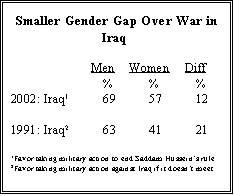 An analysis of how various demographic and educational groups view a conflict with Iraq – based on three Pew Research Center surveys conducted between mid-August and early October – shows that overall support for military action among women is greater than it was just prior to the Persian Gulf War. Currently, 69% of men and 57% of women favor military action to remove Saddam; in January 1991, the gender gap was 22 points (63%, 41%). This is in line with previous Pew Research Center surveys showing, since Sept. 11, a rise in support among women for more defense spending and increased willingness to use force against terrorism.
An analysis of how various demographic and educational groups view a conflict with Iraq – based on three Pew Research Center surveys conducted between mid-August and early October – shows that overall support for military action among women is greater than it was just prior to the Persian Gulf War. Currently, 69% of men and 57% of women favor military action to remove Saddam; in January 1991, the gender gap was 22 points (63%, 41%). This is in line with previous Pew Research Center surveys showing, since Sept. 11, a rise in support among women for more defense spending and increased willingness to use force against terrorism.
Along with older women, some of the strongest opposition to military action in Iraq comes from African-American respondents, both men and women. Blacks are divided over the use of force (46% favor, 42% oppose), while both white and Hispanic respondents show strong support (66% among white, non-Hispanics, 63% among Hispanics).
Older Democrats Opposed
Republicans below the age of 30 are nearly unanimous in their support of military action to remove Saddam Hussein from power (94%-4%). Older generations of Republicans also are supportive of using force in Iraq, but by smaller margins.
This pattern is even more pronounced among Democrats. Six-in-ten Democrats below the age of 30 (61%) favor military action while a third are opposed. Among Democrats age 65 and older, just 33% support military action and 48% are opposed. And while support for military action declines sharply across age groups in both parties, there are only modest age differences among independents. Independents who are 65 and older support the use of force at nearly the same levels as those under age 30.
Similar Age Gap in Persian Gulf, Vietnam
In surveys taken just before the Persian Gulf War in January 1991, young Americans were also supportive of military action. Asked whether the United States should use force if Iraq failed to meet the Jan. 15 deadline to withdraw from Kuwait, 54% of those under age 30 favored military action if Iraq did not comply with the deadline. Roughly the same proportion of those 30-49 agreed (55%), while support was lower among those 50-64 (48%).
Americans age 65 and older, on balance, opposed immediate military action: 49% favored waiting before using force, 41% favored taking action if Iraq did not comply.
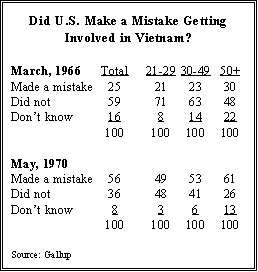 Gallup surveys from the Vietnam era show a similar age gap. In March 1966, most Americans rejected the notion that the U.S. military involvement in Vietnam had been a mistake. By May 1970, public opinion had changed dramatically – 56% felt it had been a mistake to send troops to Vietnam. Even at that stage in the war, however, amid widespread protests at college campuses, young people were divided over whether the decision to intervene in Vietnam had been a mistake (49% felt it had, 48% disagreed). By comparison, a solid majority of those age 50 and older (61%), and 53% of those age 30-49 believed it had been a mistake.
Gallup surveys from the Vietnam era show a similar age gap. In March 1966, most Americans rejected the notion that the U.S. military involvement in Vietnam had been a mistake. By May 1970, public opinion had changed dramatically – 56% felt it had been a mistake to send troops to Vietnam. Even at that stage in the war, however, amid widespread protests at college campuses, young people were divided over whether the decision to intervene in Vietnam had been a mistake (49% felt it had, 48% disagreed). By comparison, a solid majority of those age 50 and older (61%), and 53% of those age 30-49 believed it had been a mistake.
Older Americans More Concerned About Casualties
The reservations many older Americans have about military involvement in Iraq appear to be driven by a concern over casualties. In the most recent Pew Center survey, conducted Oct. 2-6, more than six-in-ten (62%) of those age 65 and older said they believe that the U.S. would suffer a large number of casualties in a war with Iraq. Fewer than half of those in every other age group – including just 39% of young people – expect major casualties.
Senior citizens also are somewhat more concerned than younger people that U.S. action against Iraq would encourage other nations to strike first against their enemies. Half of those age 65 and older say they worry about this, compared with four-in-ten of those under age 65.
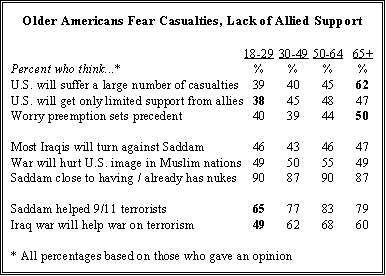 The strong support for military action from younger Americans is even more noteworthy in light of their skepticism over Saddam Hussein’s alleged terrorist ties and whether a war with Iraq would help the struggle against terrorism. Majorities in all age categories believe Saddam had a role in the 9/11 attacks, but a third of those below the age of 30 think he was not involved, significantly more than in any other age group. And while two-thirds of those over 30 think military action in Iraq will help in the war on terrorism, younger Americans are divided, with half thinking it would hurt.
The strong support for military action from younger Americans is even more noteworthy in light of their skepticism over Saddam Hussein’s alleged terrorist ties and whether a war with Iraq would help the struggle against terrorism. Majorities in all age categories believe Saddam had a role in the 9/11 attacks, but a third of those below the age of 30 think he was not involved, significantly more than in any other age group. And while two-thirds of those over 30 think military action in Iraq will help in the war on terrorism, younger Americans are divided, with half thinking it would hurt.
Yet the under-30 group expresses more optimism than their elders about future allied support for U.S. military action in Iraq. While 62% of young people expect the allies to line up with the U.S., smaller majorities of older Americans agree.
On other issues, Americans share similar perceptions of a possible war with Iraq, regardless of age. There is broad agreement that Saddam Hussein either already has or is close to having nuclear weapons. Americans of all ages are divided over whether military action in Iraq would damage America’s image in the Muslim world, and whether the Iraqi people will support Saddam Hussein or turn against him.
More Opposition From College Grads
While people of all educational backgrounds say they have given a lot of thought to the issue of using force in Iraq, college-educated people – both men and women – express greater reservations about military action than those without a college degree.
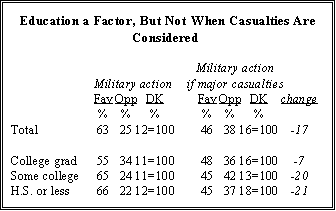 But this distinction fades when respondents are faced with the possibility that U.S. forces might suffer thousands of casualties. Slightly more than half of college graduates support military action against Iraq, compared with nearly two-thirds of those who attended some college or never attended college (65%, 66%). But when respondents were asked if they would support military action if it meant “thousands of casualties” these differences disappear. In fact, the introduction of potential casualties has a greater impact among those who have not attended college than among those who have.
But this distinction fades when respondents are faced with the possibility that U.S. forces might suffer thousands of casualties. Slightly more than half of college graduates support military action against Iraq, compared with nearly two-thirds of those who attended some college or never attended college (65%, 66%). But when respondents were asked if they would support military action if it meant “thousands of casualties” these differences disappear. In fact, the introduction of potential casualties has a greater impact among those who have not attended college than among those who have.


